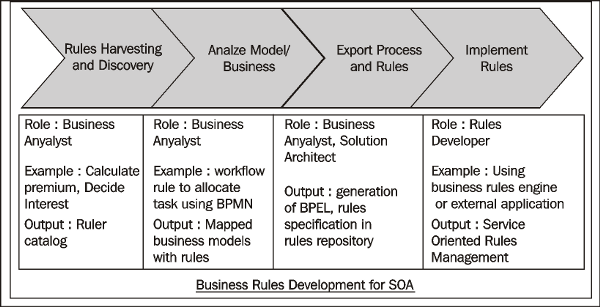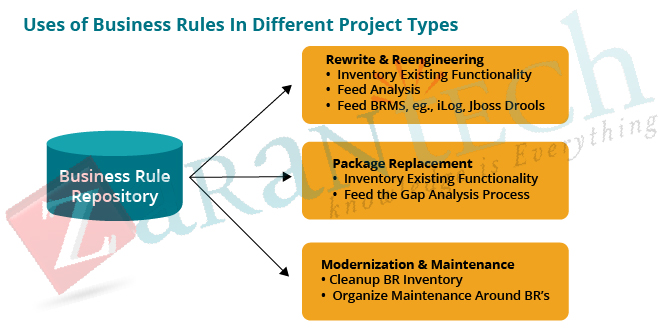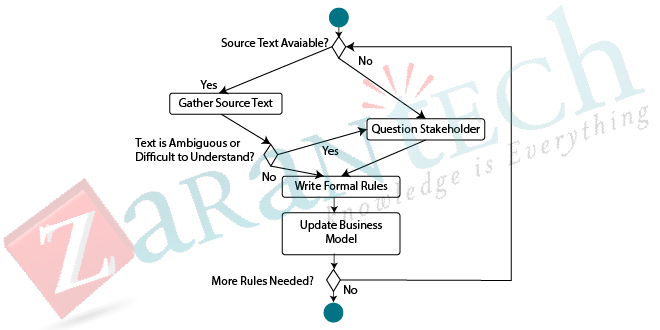An Overview of Business Rules
Category: Agile Business Analysis Posted:Oct 26, 2017 By: Serena Josh
Companies which are not well-organized have employees making and executing decisions on the fly. Clear rules and guidance is required within the enterprise regarding Business actions which are permitted and which are not. In such a scenario, all decisions made in the company would be without the structure offered by consulting company policies/guidelines. This would result in general disorder and chaos within the enterprise. Business Rules are the constraints and conditions that define how the enterprise functions and should be analysed with the help of Business needs.
What are Business Rules?
According to the International Institute of Business Analysis (IIBA), a Business rule is a precise, actionable and verifiable directive under the control of an organization which supports a business policy. Business Rules are derived from Business policies. Business policies however are non-actionable directives which support Business goals.
Business Rules originate from three components namely, terms, facts and rules. Terms stand for clear definition, facts feed terms, and rules feed facts.

Business Rules are a combination of guidelines and inferences from those guidelines which in turn direct how we conduct Business. A great analogy to explain and understand Business Rules would be – a world of Business needs, where Business Rules are important citizens. Business Rules are frequently brought up in requirements documents, and managing them in a single document eliminates the need to modify separate portions of requirements documents. This is especially true when Business Rules should be changed. While Business Rules are not requirements, they can imply requirements and narrow down the possible proposed solutions.
What Forms do Business Rules Take?
Business Rules are framed to help all stakeholders understand processes in the Business or the Business itself. Decision tables are used to document complex Business Rules. An expert system or a rules engine can be used to implement Business Rules. While technology is used to implement Business Rules, they are neither the result of supporting hardware or software.

- Access Control Issues – Example: only the Marketing Director can approve sales forecasts
- Policy – Example: Eliminate any product with < 10% contribution to the Business after its initial 8 years
- Calculation – Example: Minimum buffer stock is calculated as 20% of monthly sales forecast
Characteristics of good Business Rules:
- Business Rules should be atomic. They should be expressed in a granular format and should be as declarative as possible. A Business rule should always be framed as a precise statement defining a term, fact, and a constraint.
- Business Rules guide process flow or how the system works. A Business rule should be isolated from the process implementing it. Market experts recommend that BAs should isolate the process flow from what’s known, meaning the process should be separated from the various Business Rules. This guarantees that changes to a Business rule can be made without changing the related process. Since rules are neither process nor procedure, they should not be contained in processes themselves.
- Business Rules are only active or legitimate when stated clearly. They should not be abstract concepts in a person’s mind, but should be explicitly stated using a simple and comprehensible format.
- Business Rules should be actively managed. They are essential Business assets and should be ready for repeated use when required.
- Business Rules should be documented independently of the conditions of their enforcement. The conditions can be who, when, where and how.
- Business Rules should be numbered for convenient identification and traceability.
- Business Rules should be documented using attributes like source, example, name/description, associated rules, revision history, version number, and more where available.
- Each Business rule should have a single focus and be cohesive.
Who is a Business Rules Analyst?
Business analysts are regularly needed to produce and analyse Business Rules. However, there is a specialist BA profile devoted to Business Rules management and analysis- this is the Business Rules Analyst.

Go through our Business Analysis Interview Questions to crack the Interviews.
A Business Rules Analyst is usually needed to:
- Analyse, architect and implement Business Rules that power an enterprise and its operations
- Comprehend the method by which Business Rules are decided, imposed, documented and managed
- Match Business Rules with the processes they guide
- Update Business Rules in-keeping with organizational changes
- Check the rules that will be influenced by specific organizational changes
- Manage risks that may hamper implementation of Business Rules
Conclusion
Business Rules can be easily analysed when they are documented and managed independent of the processes enforcing them. Occasionally, when not planned properly, Business Rules may contradict one another when combined. Business Rules should be progressively maintained to see that they stay relevant to the enterprise.
need for cybersecurity, the attractiveness of crossover skills, the data-driven nature of technical projects, etc., there will be a huge demand for business analysts in the upcoming year.
I hope that by now you have had an overview of Business Analysis. Before you enroll in ZaranTech’s certification course on Agile Business Analysis do check out this demo video:




 99999999 (Toll Free)
99999999 (Toll Free)  +91 9999999
+91 9999999